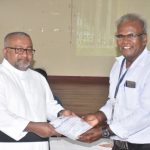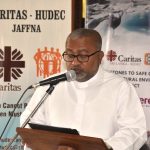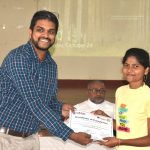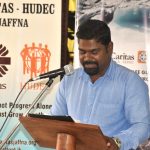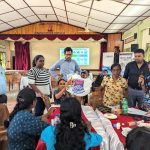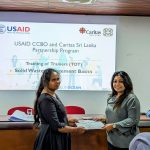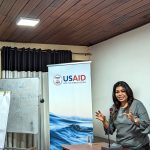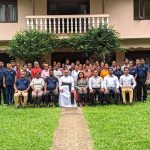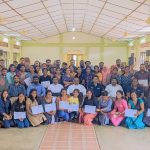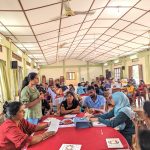Caritas Sri Lanka in collaboration with the resources of USAID, Clean City Blue Ocean Organization conducted two Training of Trainers (TOT) programs at Kandy and Jaffna. Sixty participants participated in the TOT held on 20th & 21st of October 2023 at Kandy representing Kandy, Badulla, Galle and Ratnapura Dioceses while another 70 participants participated in the TOT held on 23rd & 24th of October 2023 at Jaffna representing Jaffna, Mannar, Vanni, Trincomalee, and Batticaloa Dioceses.
Importance of Solid Waste Management
Solid waste management is a critical aspect of environmental sustainability, encompassing the treatment, and disposal of various types of waste generated by human activities. It is not solely the responsibility of governments; it requires active participation from communities, businesses, and individuals. Education and awareness campaigns play a pivotal role in fostering a culture of responsible waste management and instilling a sense of environmental stewardship among the public. Moreover, the promotion of waste reduction initiatives and the adoption of sustainable consumption practices are integral components of environmental conservation. Hence, the major objective of this TOT program is to promote environmental conservation by creating awareness of the adverse impacts of improper waste management and empowering the various communities to adapt for behavioral changes regarding the segregation and disposal of wastes.
The TOT program spanned two days and was structured around the following four key areas
- An introduction to the basics of solid waste management: It includes the means and ways of waste generation, types of waste, waste hierarchy, the cycle of solid waste management, and the impacts of waste on health and the environment
- Role of Local Government and Governance in Solid waste management: The program explained how the system in Government and local authorities contributes in proper solid waste management. In addition, a glimpse of knowledge on advocating for sustainable waste management with the involvement of local authorities was also shared during the sessions.
- An introduction to plastic waste: Participants gained practical knowledge about types of plastic waste. In addition, how plastic waste has become a threat to human life and how plastics are polluting the ocean were well explained. This was reinforced through prepared videos and insights shared by the resource team.
- An introduction to the concept of Circular Economy: The main objective of this sub-session is to introduce the ‘waste to wealth’ concept through the waste hierarchy ‘3R’ (Reduce, Reuse, and Recycle). The resource team highlighted the available income-generating opportunities with the use of waste as a resource.
The Resource Team
Mr. U.G. Ekanayaka : a solid waste management specialist in USAID CCBO Sri Lanka and Maldives, Mr. Prabuddha Batuwatte : Private Sector Engagement Advisor at USAID CCBO Sri Lanka and Maldives, Mr. Roshan Delabandara : Grant specialist from USAID CCBO Sri Lanka and Maldives, Mr. Shanmugarajah : Capacity Development and Governance Manager from USAID, CCBO were the resource team facilitated the TOTs. Their distinguished experts in solid waste management were instrumental in making this program a successful one. In addition, Mrs. Nilanka Wijayanayake the Country Director of Sri Lanka and Maldives USAID, CCBO participated in the TOT program at Kandy and shared her experience regarding the project implementation and some of their best achievements with the participants. Simultaneously, Rev. Fr. Luke Nelson the National Director of Caritas Sri Lanka participated in the TOT program at Jaffna. He emphasized in his speech the importance of carrying forward the expertise and knowledge gained in the TOT to the local communities.
Empowering the communities for Sustainable Waste Management
The participants are expected to carry forward the expertise and knowledge gained during the TOTs to their local community through various collaborative efforts to ensure the efficiency and effectiveness of these TOTs. Hence, the participants were requested to submit a project model distinguished for a selected waste-related problem in their area in consultation with their local community. CSL and USAID, CCBO expect waste-to-wealth project models from the participants as the concept of circular economy, focusing on closing the loop of ‘take-make-dispose’ can be a catalyst concept of for promoting and maximizing the use of resources at the grassroots level. Moreover, practicing the concept of circular economy can create income generation for whoever doing it at the grassroots level.
In conclusion, Caritas Sri Lanka’s Training of Trainers program in Kandy and Jaffna play a pivotal role in empowering communities to take responsibility for proper solid waste management and contribute to environmental conservation. By equipping participants with knowledge and skills and encouraging them to implement waste-to-wealth projects, these programs aim to create a more sustainable and environmentally responsible future for Sri Lanka.


